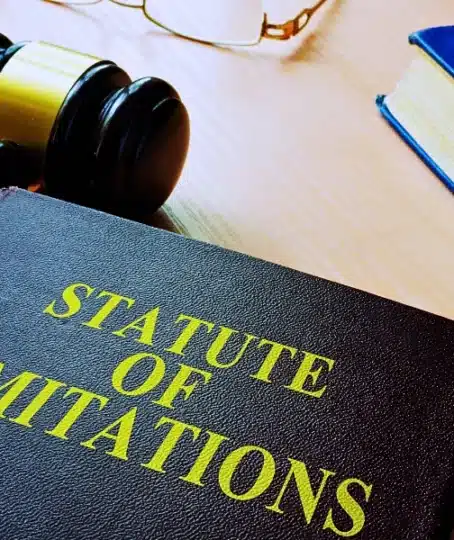
What to Do If You’re Injured in a Car Accident While Working in Illinois Work-related car accidents are common. Between...


One question accident victims in Peoria often ask is “How long after an accident can you sue?” Illinois law gives you the right to sue if you have been harmed in an accident arising from another person’s negligence or wrongful act. The state’s statute of limitations generally gives you two years from the accident date to hold the at-fault party financially accountable. Failure to file a personal injury claim within that timeframe may render your claim null and void. Circumstances may, however, compel the court to toll the statute of limitations.
It’s best to involve a Peoria personal injury lawyer at Strong Law Offices to ensure your lawsuit filing process goes smoothly. Our lawyers understand the state-specific statute of limitations. They have helped thousands of accident victims navigate issues with delayed filings, and they can help you, too. Call us at (309) 688-5297 to schedule a free consultation.

The statute of limitations is a law that specifies deadlines for accident victims to file lawsuits against other individuals or entities. Under this law, people who sustain injuries in accidents have a two-year window from the accident date to file claims. Other personal injury cases have different timelines. For example, personal property damage and workers' compensation claims have a five- and three-year filing deadline, respectively.
When trying to recover their damages, victims often file insurance claims without giving credence to filing a legal claim. Insurance providers usually resist compensating claimants, taking months or years to settle a claim. By the time the victims are considering court, the time to file a lawsuit has elapsed. Remember, if the accident lawsuit timeline expires, you lose your right to file the claim unless certain circumstances compel the court to make exceptions.
A personal injury lawyer can provide the support and legal guidance necessary to overcome the hurdles that keep you from a filing a claim on time. Your lawyer will evaluate your case and begin the filing process at once. The lawyer knows the rules outlined in the statute of limitations and can leverage his or her legal knowledge to ensure your claim gets filed on time.
Wrongful death lawsuits are unique claims because responsibility for filing these claims lies with the personal representative of the decedent’s estate. Like other general accidents, the representative must file the claim within 2 years.
The only difference is that the deadline for filing a wrongful death claim starts from the time of death, not necessarily from the date the accident took place. An example is when the victim suffers injuries, but dies in critical care after holding on to his or her life for six months after the accident. In such a case, the statute of limitation starts at the time of death (six months after the accident).
In other cases, the time of death and the time of injuries are the same. The statute of limitation starts on the date of the accident/death in such cases.
A government agency or employee is a special defendant in a personal injury claim. In a claim against the government, the victim must submit the case to the appropriate authority. For example, if you get injured in an accident because of potholes on the road, the government agency in charge of maintaining that road is the liable party. The timeline for filing a lawsuit against the government depends on the agency you’re suing.
Suppose Peoria County’s Department of Transportation is the defendant in your claim. In that case, your claim falls under the Local Government and Governmental Employees Tort Immunity Act. Whether it’s a slip-and-fall, car accident, or construction injury, all lawsuits against the government are reviewed by a Third-Party Administrator.
Lawsuits against the state government follow a different set of legal statutes. Victims must file all claims against the state government according to the Court of Claims Act. The lawsuit must be filed at the Clerk of the Court of Claims within a year of the accident date.
Some situations may compel the court to toll the statute of limitations. Tolling means temporarily stopping the timeline for suing. On other occasions, the court can decide to extend the timeframe. Nonetheless, compromises on the statute of limitation are only possible under specific circumstances. They include:
One situation that warrants tolling is if the plaintiff was a minor (below 18 years) when he or she suffered injuries. This is because Illinois law prohibits a minor from filing a personal injury claim. In this case, the court will toll the statute of limitations until you reach 18 years old.
The doctrine that halts the statute of limitations when the plaintiff is a minor is the same that applies when the accident victim has physical or mental incapacity. Legal disability does not just apply to age. It also applies to any mental conditions or disorders that may make it challenging for the claimant to understand his or her rights fully.
You can petition the court to toll the statute of limitation until you fully recover if you have a disability resulting from an accident that prevents you from filing a personal injury claim. You must prove that your disability stems from an accident caused by the defendant's negligence to successfully petition for tolling.
Sometimes, the defendant in your personal injury lawsuit might face criminal charges in court because of the same incident. The courts usually prioritize criminal proceedings over civil cases. So, you must wait until the criminal case is resolved before you can sue the same defendant. Criminal cases involving severe bodily injuries and homicides take a long time to complete. In such a case, the court tolls the statute of limitation until the criminal proceedings' completion.
Many people who survive traumatic injuries after an accident hesitate to take legal action. While waiting allows you to recover and think critically about your next course of action, hiring a lawyer immediately after the accident has its upsides. An attorney can help you:
A personal injury attorney with a reputable track record knows how to negotiate with insurers to ensure you receive an acceptable settlement offer. Such an attorney commands respect from insurers in and out of the courtroom. An insurer can’t attempt to minimize or provide unfair compensation because it will prompt your personal injury lawyer to go to trial.
If your circumstances are preventing you from filing a personal injury claim, a lawyer can investigate the case and petition the court to stop the statute-of-limitation countdown. The timeline until the countdown starts again depends on the reason that motivated you to consider the toll in the first place. Circumstances might arise that might change the case dynamics. In that situation, an attorney can provide valuable legal guidance and use compelling arguments to convince the court to give in to your petition.
But when is the right time to hire a personal injury lawyer? It would be best to partner with a lawyer as soon as possible after an accident. Most lawyers are available by phone, and you can contact them to explain your case and schedule an official case evaluation.
At Strong Law Offices, we are dedicated to helping accident victims in Peoria and Illinois at large recover their rightful compensation after accidents. We have over 25 years of experience representing the rights and best interests of victims in personal injury cases. We have also helped clients toll or extend the statute of limitations to ensure they exercise their right to sue. Contact us to schedule a free consultation with one of our personal injury attorneys.

What to Do If You’re Injured in a Car Accident While Working in Illinois Work-related car accidents are common. Between...

Why Pedestrian Accidents in Parking Lots Surge During Summer in Illinois As temperatures rise, more individuals tend to engage in...

Drowsy drivers are a serious and often overlooked danger on Illinois roads. Each year, fatigued drivers contribute to thousands of...